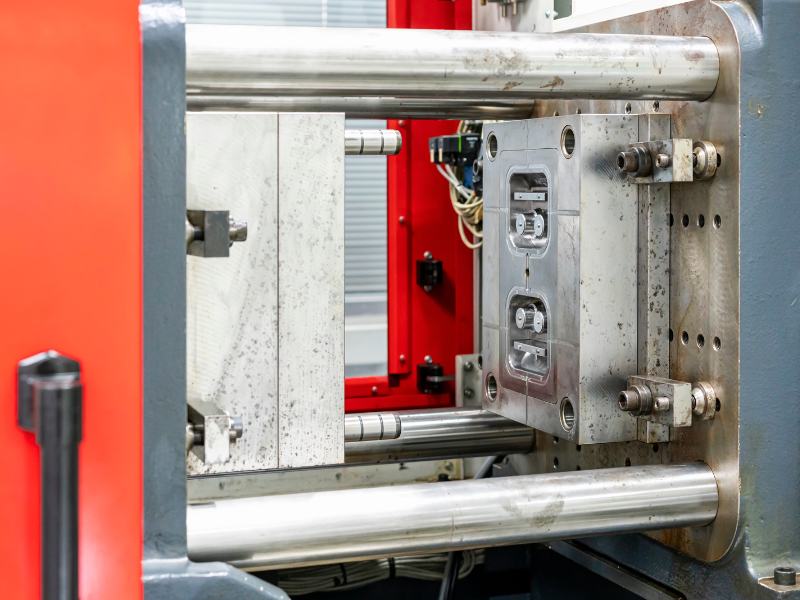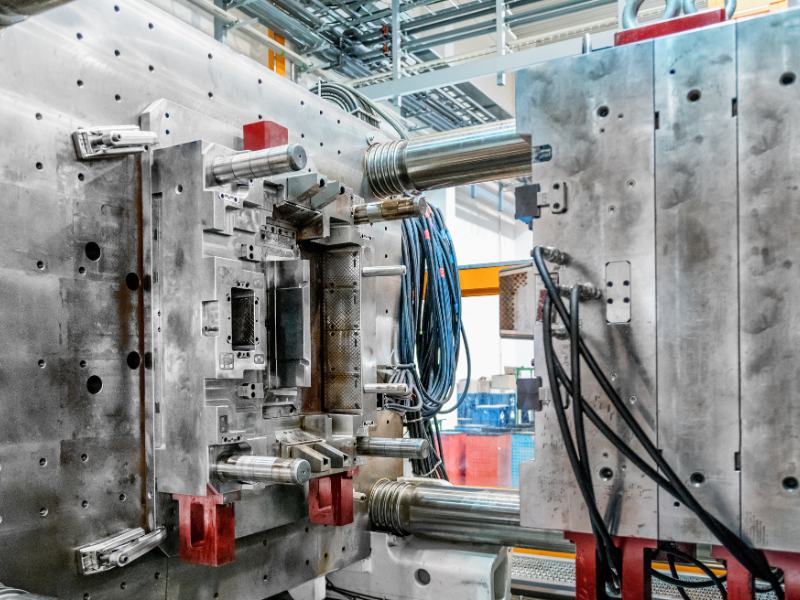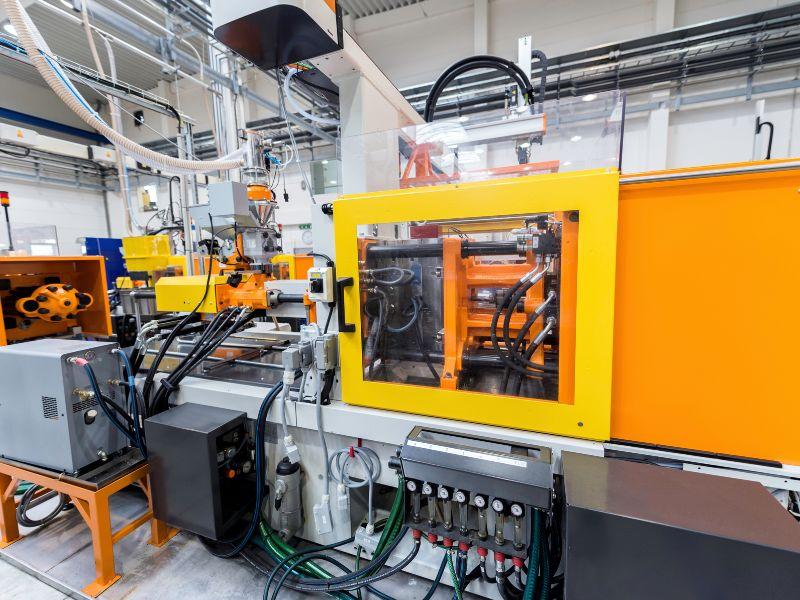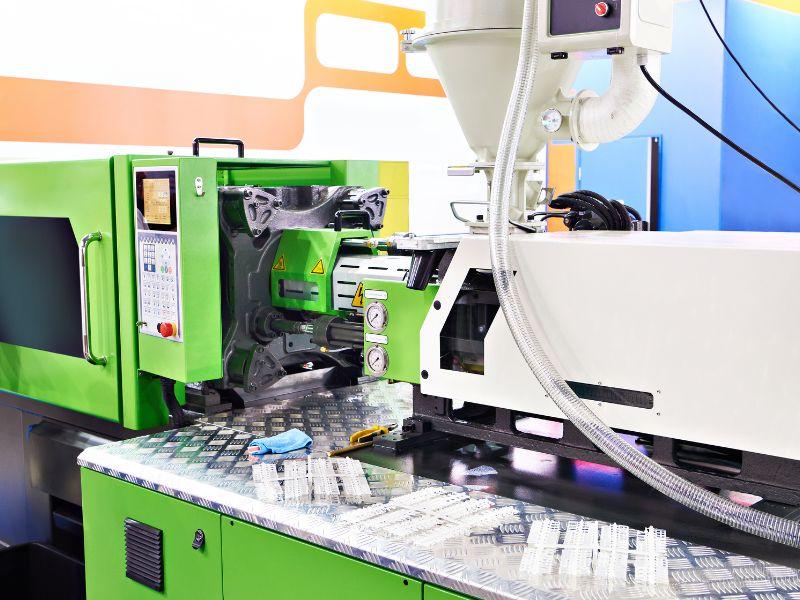Czym jest formowanie obojętne
Formowanie wkładkowe, also known as metal insert molding or nadformowanie, is a manufacturing technology that produces pre-formed plastic parts. It is a type of overmolding where the substrate is inserts rather than plastic parts. Before molding, the insert is inserted into an injection overmold, creating a single final product that combines a single molding part with inserts. The insert, which can be made of metals, ceramics, copper screws, or other plastic or metal materials, is inserted in a mold cavity before being injected with plastic resin.
If the inserts are constructed of plastic or molded plastic pieces, we call this overmolding, whereas the first shot of the plastic insert part is referred to as the substrate. If the inserts consist of metal, we will refer to the process as formowanie wkładek metalowych.
Many industries on the global market, including electronics, automotive, furniture, and many more, use insert molding extensively to reduce assembly costs for parts that require extreme strength, durability, and precision. Insert molding can produce complex plastic products with different insert materials or components in a single molding process, eliminating the need for separate assembly steps and lowering production costs.
In addition, formowanie wstawkowe can increase part quality and reliability by forming a strong link between the insert and the plastic resin. We call this metal brass formowanie wstawkowe or screw insert molding when we insert metal screws and plastics into a molded part or when we mold different brass screws or materials into a single molding part.
Custom insert molding not only lowers assembly and labor costs, but it also outperforms assembly parts by reducing the size and weight of the part, enhancing component reliability, and delivering improved part strength and structure with enhanced design flexibility.
Today, over 90% of insert molded parts come from Chińskie firmy produkujące formy, where low labor costs and high-quality control are significant factors. They can assemble and ship your final parts from China.
Jesteśmy profesjonalistami w produkcji form plastikowych od ponad 18 lat, z silnym zespołem inżynierów, zespołem producentów form i zespołem produkcyjnym kontroli jakości.
We can handle your project from start to finish, regardless of whether it involves normal injection molding, 2K injection molding, Niestandardowe formowanie wkładek, medical plastic inejction molding, metal insert molding, automobile industrial molding, cosmetic injection molding parts, home appliances injection molding, certificate, usługi montażu produktów, and product packing. if you have an insert molding project in hand that is looking for a professional injection molding company, welcome to send us your project, we will quote you a price in 24 hours.
Proces formowania wkładek
Ten formowanie wstawkowe process starts off by either inserting the metal inserts before the injection molding process (normally used technology) or they can be inserted after the injection molding process (pressed in). An insert molding process operator or a robotic arm will load the inserts into the mold if you choose to insert them before the plastic injection molding process.
Jeśli zdecydowano się na wkładanie metalowych wkładek po procesie formowania wtryskowego tworzyw sztucznych, po procesie formowania wtryskowego tworzyw sztucznych mogą być potrzebne narzędzia do prasowania. proces formowania wtryskowego po zakończeniu i schłodzeniu części. Następnie należy wcisnąć wkładki gwintowe do otworu lub wydrążonego występu. Istnieją dwa rodzaje wciskanych wkładek: wciskane na zimno i wciskane na gorąco.
Simply put, cold pressed formowanie wstawkowe presses a cold metal screw or other insert into the hole position, while hot pressed insert moulding inserts a hot metal insert into the hole position and cools the metal part. Both types of molding process necessitate an interference fit between the diameter of the hole and the metal insert.
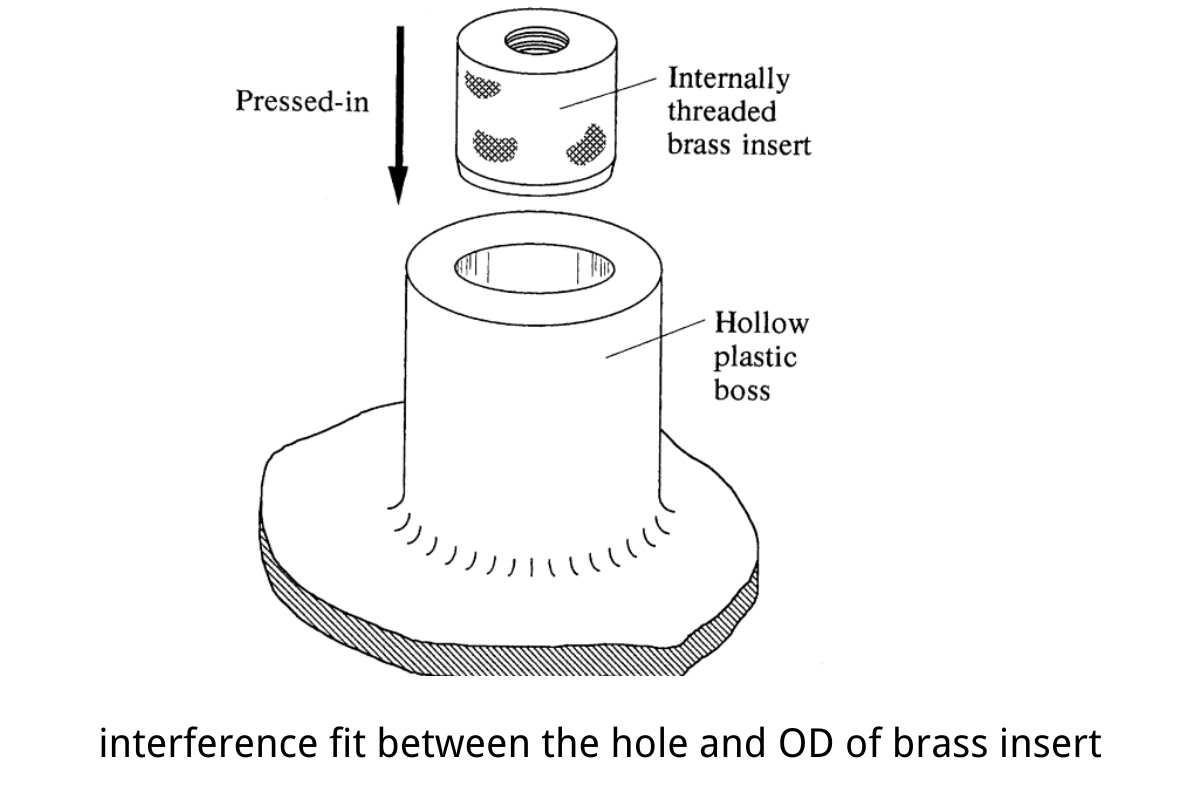
Typically, formowanie wstawkowe integrates the insert into the mold prior to the injection molding process, which is its primary benefit. Everything we discuss below pertains to this process, which we can refer to as insert injection molding or overmolding.
Ta procedura idealnie obniża koszty wstawiania, co może zaoszczędzić naszym klientom znaczne koszty projektów formowania wtryskowego. Jeśli chcesz dowiedzieć się więcej o formowaniu wtryskowym wkładek, możesz przejść do wstaw formowanie wtryskowe Więcej informacji znajdziesz na stronie.
In the context of the insert molding process, the use of a robotic arm for part handling can yield significant benefits. When it comes to removing the molded parts and getting them ready for more processes, a multiple-axis robot can do that faster and more accurately than a human. After the molded part is created and ejected from the mold, the robot grips the part and moves it to either a location to be held or onto a system to be inspected. The general layout of the manufacturing equipment and the type of product under creation determine this decision.
In order to assure a high level of quality for many parts that go through formowanie wstawkowe, robots can have vision systems mounted on them. These vision systems inspect parts faster than humans and know exactly what the metal component’s placement accuracy is.
Several industries thrive on the products created through the insert moulding process. Indeed, this type of custom injection insert molding process produces a wide range of products.
Kupowanie listew wpuszczanych od Chińczyków forma wtryskowa firma will save a lot of money since the labor costs are low in China. Below is the plastic injection molding part that is created through this type of custom insert molding process. This is the brass insert molding part, which has more than 20 metal screws molded together with the PC plastic material.

Insert Molding vs. Overmolding
Insert molding is a sort of overmolding; nevertheless, there are also few differences between insert molding and overmolding. Below, we have listed some of the most important differences between overmolding and insert molding.
Formowanie wkładek:
Insert molding is a process that involves placing a pre-formed part, which is often made of metal or plastic, into the cavity of the mold. After that, molten plastic is injected around the pre-formed portion to make a single part. When the insert is incorporated into the component, it ends up supplying the component with mechanical strength, electrical conductivity, or other particular characteristics.
This molding manufacturing process is commonly used for manufacturing items like threaded fasteners, electrical connectors, and tools.
Insert molding, typically, only one material is injected in this process, with the insert providing functionality.
Overmolding:
In the overmolding process, a second plastic material is put on top of a base plastic part. Injection molding tools are also used to make the base plastic part. The first part, called the substrate, is usually rigid, and the second part, called the overmold, is usually softer or more flexible. For example, a thermoplastic elastomer (TPE) is poured over the substrate to make it more comfortable, flexible, or nice-looking.
Overmolding is a process that is usually used for plastic parts that need to be bonded to other materials, like soft-touch grips or seals.

Key Difference:
Insert molding normally incorporates a hard insert into the molded part, whereas overmolding process involves adding a layer of material over an existing substrate for added features like flexibility or texture.
Insert molding costs.
There are some factors that affect insert molding costs.
Cena wkładki określa pierwszy komponent. Wkładki można tworzyć przy użyciu różnych materiałów formierskich, takich jak tworzywa sztuczne, takie jak ABS, PC lub PA, oraz wkładki metalowe, takie jak stal lub aluminium. Wykorzystany materiał, rozmiar i złożoność wkładki oraz wymagana ilość wpływają na koszt wkładek. Wykonanie 100 sztuk wkładek, w przeciwieństwie do 1000 metalowych wkładek, spowoduje znaczną różnicę w cenie jednostkowej.
The cost of the insert mold contributes significantly to the total cost of formowanie wstawkowe. The mold plays a crucial role in the injection molding process since it defines the finished part’s shape and characteristics. This initial cost will exceed the unit cost; if you plan to manufacture thousands of parts, creating insert molds will be beneficial. If the insert is made of plastic by injection molding technology, then we may call it overmolding. This will require two molds, one for the first plastic parts and one for overmolding, which will increase the initial mold cost.
Kolejnym istotnym czynnikiem wpływającym na koszty formowania wtryskowego jest robocizna. W porównaniu do standardowego formowania wtryskowego, formowanie wtryskowe wkładek wymaga większego nakładu pracy, ponieważ operatorzy muszą ręcznie umieszczać wkładki w formie przed każdym wtryskiem. Wydłuża to czas cyklu i zwiększa koszty ręczne.
Konsultacja z profesjonalnym producentem form wtryskowych zapewni dokładne oszacowanie kosztów formowania wtryskowego wkładek. Mogą oni ocenić konkretne wymagania projektu i zapewnić szczegółową analizę kosztów w oparciu o dane 3D i specyfikacje, wskaźnik odpadów i wielkość produkcji. Pomoże to w podjęciu świadomej decyzji i określeniu, czy formowanie wtryskowe wkładek jest właściwym wyborem dla danego projektu. Zachęcamy do przesłania nam projektu formowania wtryskowego wkładek, a my podamy cenę w ciągu 24 godzin.
Poniżej znajduje się kilka z nich niestandardowe elementy formowane wtryskowo zrobiliśmy wcześniej. Jeśli masz jakiś projekt, który wymaga formowania wkładek mosiężnych, nadformowanie, or any metal wstaw formowanie wtryskowe, send us your requirements for a quotation.
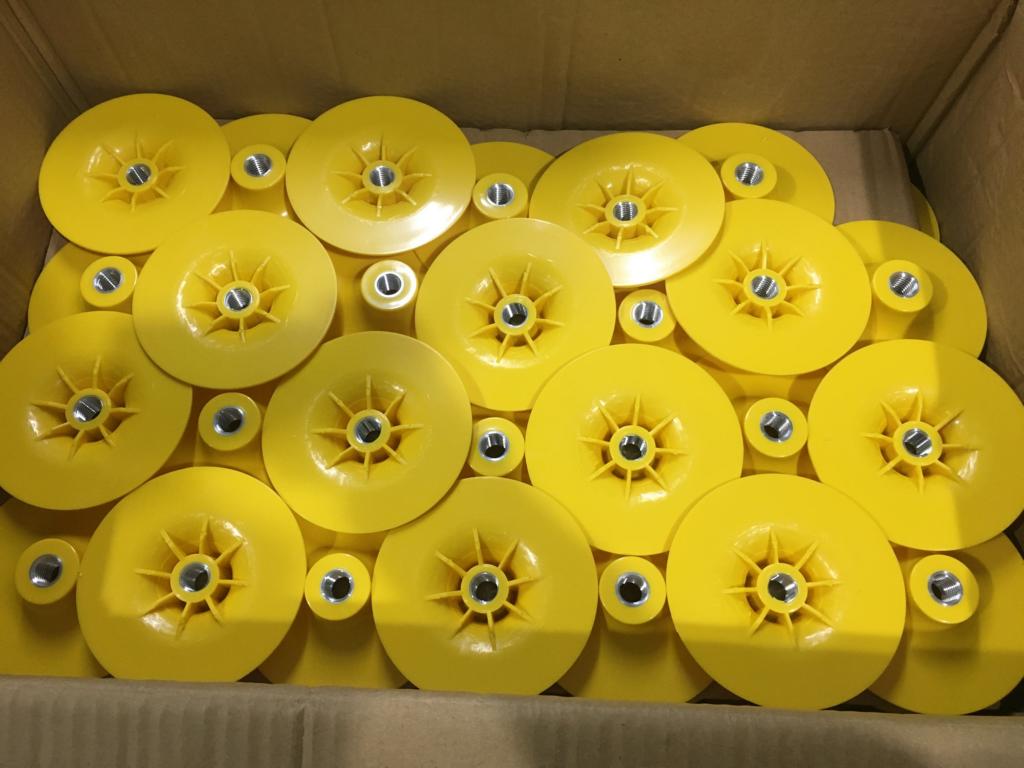
Zalety formowania wtryskowego
Niezwykle skutecznym substytutem konwencjonalnych technik montażu elementów wkładanych za pomocą klejów, połączeń, spawania, lutowania lub elementów złącznych jest formowanie wtryskowe. Istnieje wiele zalet tej najnowocześniejszej metody, która może znacznie poprawić efektywność i kaliber formowanych komponentów. Poniżej przedstawiamy kilka zalet formowania wtryskowego wkładek w porównaniu z tradycyjnym formowaniem wtryskowym.
Redukcja końcowych części do formowania
The smaller molding pieces produced by insert molding are among its main benefits. Compared to conventional assembly techniques, this wstaw formowanie wtryskowe process creates smaller pieces by molding metal inserts with plastic during the molding process. This shrinkage enhances the overall performance of the molding process in addition to saving material costs. Additionally, a significant reduction in the parts’ weight enhances both performance and cost-effectiveness.
Niższe koszty robocizny i montażu
Formowanie wtryskowe nie tylko zmniejsza rozmiar, ale także znacznie obniża koszty pracy i montażu. W przeciwieństwie do pracochłonnych, wieloetapowych tradycyjnych metod montażu, formowanie wtryskowe z wkładką integruje dwa lub więcej elementów w jedną część formującą w jednym ujęciu. Ta wydajna metoda znacznie zmniejsza koszty pracy i montażu. Złożone procedury montażowe nie są konieczne, ponieważ wszystko, czego wymaga się od pracownika podczas procesu formowania, to po prostu umieszczenie metalowego elementu w formie. Co więcej, pojedynczy wtrysk jest idealny do skomplikowanych części formowanych z wkładkami, ponieważ może kształtować jedną lub kilka wkładek.
Zwiększona wiarygodność
Zwiększona niezawodność, jaką zapewnia formowanie wkładek, to kolejna godna uwagi zaleta. Proces formowania wkładek zapewnia silne i długotrwałe połączenie poprzez ścisłe formowanie każdego elementu w termoplastycznym tworzywie sztucznym. Zapobiega to powszechnym problemom związanym z procesem montażu, takim jak poluzowanie części, niedopasowanie i niewspółosiowość. Zastosowanie żywicy z tworzywa sztucznego w procesie formowania dodatkowo zwiększa odporność części na naprężenia i wibracje, zwiększając tym samym ich niezawodność i trwałość.
Większa elastyczność projektowania
Insert molding makes it simple for designers to think about how those parts should be assembled together. By eliminating the need to think about how to assemble pieces or attach metal and plastic components together, designers can save time and focus on other aspects of the design. This special molding process simplifies the solution to numerous design problems.
Niższe koszty formowania wtryskowego i zwiększona wydajność
Formowanie wkładek pomaga poprawić wydajność i obniżyć ogólne koszty formowania wtryskowego. Operatorzy mogą mieć trudności z ustawianiem wkładek podczas etapu formowania, zwłaszcza jeśli pracują z małymi lub wieloma metalowymi elementami, które są podatne na upadek. Z drugiej strony, korzystanie z pionowych wtryskarek znacznie zwiększa produktywność, oszczędza czas i zmniejsza prawdopodobieństwo upuszczenia lub niewłaściwego umieszczenia wkładek. Pomaga to obniżyć koszty formowania wtryskowego, jednocześnie poprawiając ogólną wydajność procesu formowania.
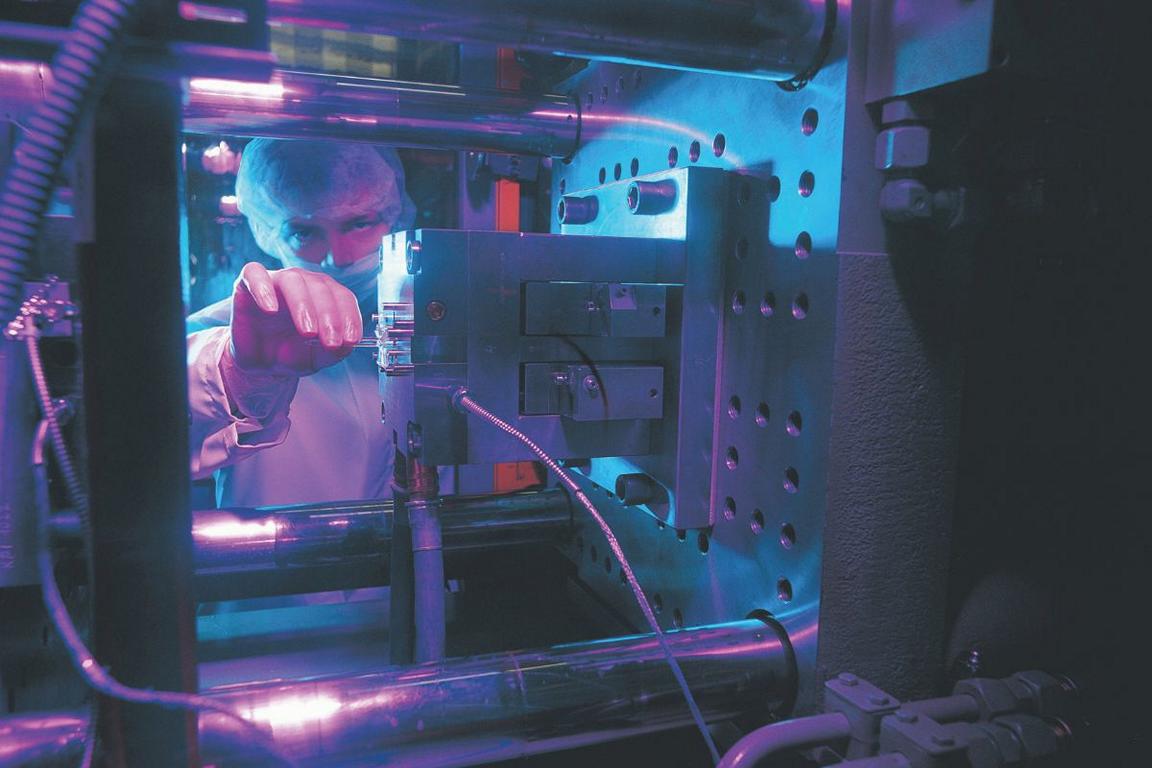
Jeśli masz wkładkę odlewanie project in hand, contact us to get a price. We have been in this field for over 18 years, specializing in custom insert molding. We are experts at providing formowanie wstawkowe services that are tailored to each individual client’s needs.
Ponieważ każdy projekt jest inny, Sincere Tech jest jednym z 10 najlepszych producenci form w Chinach and provides a variety of Niestandardowe formowanie wkładek options to meet the specific requirements of each of our clients. To guarantee that we offer the highest quality insert mold and any other custom injection mold, we have skilled mold makers that operate with cutting-edge machinery.
Nasz usługi formowania wkładek are excellent and reasonably priced. In order to maintain cheap prices while producing high-quality insert injection molding goods, we employ cutting-edge technology. This enables us to offer low pricing to our clients without sacrificing quality.




